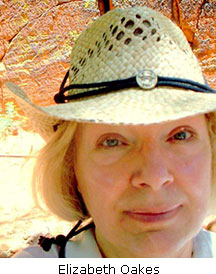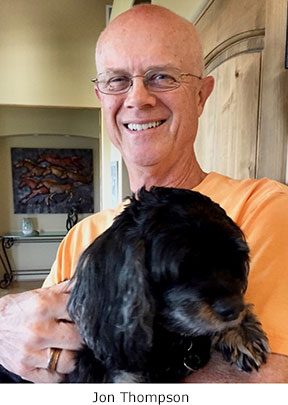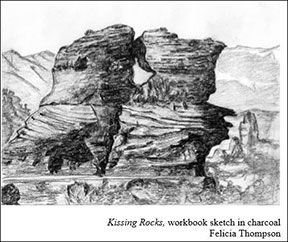Sedona Lit is a series by Dr. Elizabeth Oakes, an award winning poet and former Shakespeare professor. A Sedonian of four years, she highlights the literature, written or performed, of Sedona, past and present.
 By Elizabeth Oakes
By Elizabeth Oakes
(May 22, 2017)
Jon Thompson is well-known as a member of the city council, where he wrestles with such thorny issues as tourists, traffic, and budgets. However, he’s also a poet, with a background in literature.
In this installment of Sedona Lit, the first in a series about prominent people in Sedona who deserve to be known for their writing, Jon shares some of his poems and answers some questions.
EO – What is your experience with literature? For example, were you an English major? Who are your favorite writers?
JT – BA in English at California Lutheran in Thousand Oaks, CA. MA in English in the Creative Writing program (poetry) at Stanford as a Stegner Fellow (Donald Davie was my advisor). One year in the PhD program in English at Southern California on a teaching assistantship.
My favorite writer is Shakespeare. I know, anybody can say that, and it doesn’t prove that I’ve read anything beyond high school assignments. But what am I going to do, lie? He’s the best, whoever he was. Milton, Dickinson, and Whitman are up there for me, too, but Shakespeare is the one I’d take on a desert island. Of modern writers, I’d probably have to say Updike and Roethke.
 EO – Have you written all along, or did you start recently?
EO – Have you written all along, or did you start recently?
JT – I wanted to be a writer when I was in school and have always fantasized about writing and publishing a book of some kind. But I was happy with my career in technical writing management and devoted all my professional efforts in that direction. I thought I might take it up in retirement, but I’ve found that more serious avocations take up most of my time, and I’m OK with that. When I write now, it’s mostly for a little comic relief.
EO – Why the limerick?
JT – It requires focus on a single thought. It’s informal and humorous, sometimes marginally bawdy or absurd–the opposite of pretentious types of poetry. But it still allows for all kinds of acrobatics with the language. And I can compose one completely in my head–while driving, in the shower, trying to sleep, etc.–so it never seems like work. Also, a limerick is a pretty cheap but unique gift, so I tend to hand them out on birthdays and special occasions.
[I don’t know what inspired this one:]
“Is that what you’re wearing, you jerk?
Said Louise to her late husband Kirk.
Though his corpse remained mute
In his green sharkskin suit,
His lips had been stitched in a smirk.
[Entered in the Arizona Republic Heat Limerick contest:]
Barbara Quincy was no Phoenix prude:
Every summer she’d grill her lunch nude.
She’d just step on her porch,
Then jump back, as the scorch
Left her buns and her dogs Barbie-Q’d.
[Sent to a friend on her 60th birthday:]
Once a year Father Time takes his licks
On the day your birthometer clicks.
It’s a terrible blow
If it ends with an “O”,
But much worse if it starts with a “6”.
[Sent to a friend with an April birthday:]
A birthday in springtime is awesome:
You don’t age each year, you just blossom.
Still, there’s cake you must chew—
You should fake a smile, too—
So while you have teeth, better floss ’em.
EO – Could you expand on your ideas about rhyme?
JT – Rhyme isn’t important per se, but sound is. So rhyme should always be a tool in a poet’s toolkit to consider based on the idea to be conveyed. And I think it’s an overlooked tool from the creative standpoint: coming up with a rhyme can lead the poet into metaphors or other connections that might not have occurred. Look at some of Paul Simon’s lyrics, for example. Anyway, as far as limericks are concerned, rhyme is essential. It’s the rhyming that provides the wit and that final punch.
EO – Is there a certain time when you write? Do the limericks just come? Or do you write them in stages?
JT – I’m an occasional poet. I will sit down and write one for an occasion. Or, occasionally, one just comes. For me, setting aside a specific time to write wouldn’t work.
EO – What is the role of humor in poetry?
JT – No special role. Poetry can be about any aspect of life, and life is sometimes funny or absurd. So we have funny and absurd poetry and a poetic form for it.
EO – Anything else?
JT – I do sometimes feel inspired to express something that isn’t funny or absurd. And every couple years or so I might push something out that shows my non-frivolous side and that I’m reasonably proud of, for instance, “Kissing Rocks.”
 These rocks were always kissing. Long before
These rocks were always kissing. Long before
A billion suns and moons caressed their shoulders
With rays and shadows, long before billions more
Drops of rain and wisps of wind unclothed them;
Even before the oceans came and went
And steaming magma shook and shoved beneath them,
They held their pose: one pressing slightly forward,
The other softly yielding and receiving.
And now we take our turn: we point and say,
“Oh look, they’re kissing!” as if they mimicked us,
As if we were the first to show devotion
Or love eternally: as if these rocks
Would care that humans raced beneath them, paused,
Sensed something like forever, and then left.
EO – Thank you, Jon, for sharing these poems and thoughts and for letting Sedona know this side of you!




1 Comment
Glad I was able to read the poems of Jon Thompson our Sedona Councilman.